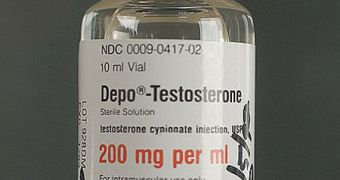In a new series of scientific investigations, researchers determined that obese men tended to exhibit much lower levels of the hormone testosterone than average-weight males. The correlation was even stronger in the case of individuals suffering from diabetes, where 50 percent of the test subjects exhibited the hormonal deficiency. If the men were only obese, then some 40 percent had lower-than-normal testosterone concentrations in their blood, LiveScience reports.
The research builds on previous work published last year, which showed that men who held on to their diets and exercises – and lost a lot of weight – reported having better intercourse than ever before. Scientists say that elevated levels of testosterone, associated with a weight more close to the normal, healthy one, may be partially responsible for this. The previous findings did not hold true for very obese males who lost only a few pounds, but for those who lost a significant amount of weight.
Though this is the first study to accurately measure a correlation between weight and testosterone levels, the Endocrine Society in the United States is currently recommending that all people suffering from type II diabetes get their testosterone levels checked out in the hospital. Following the new studies, it may become common practice to perform the same type of measurements in obese men as well, including in obese teens.
“The effect of diabetes on lowering testosterone levels was similar to that of a weight gain of approximately 20 pounds,” explains University of Buffalo Department of Medicine endocrinology specialist Dr. Sandeep Dhindsa, who was also the lead researcher on the work. Details of the new investigation appear in the latest online issue of the respected scientific study Diabetes Care. Dr. Dhindsa was the lead author of the paper, which looked at the cases of 2,165 men, aged 45 or older. All test subjects were part of the Solvay Pharmaceuticals Inc.-funded Hypogonadism in Males (HIM) study.
“In view of the fact that almost one-third of the US is obese, these observations have profound pathophysiological, clinical, epidemiological and public health implications,” Dhindsa adds. “In view of the high rates of subnormal testosterone in patients with obesity or diabetes, testosterone concentrations should be measured regularly in these populations, especially when these conditions occur together,” adds the head of the University of Buffalo Division of Endocrinology, Diabetes and Metabolism, Dr Paresh Dandona, who was also a researcher on the investigation.

 14 DAY TRIAL //
14 DAY TRIAL //